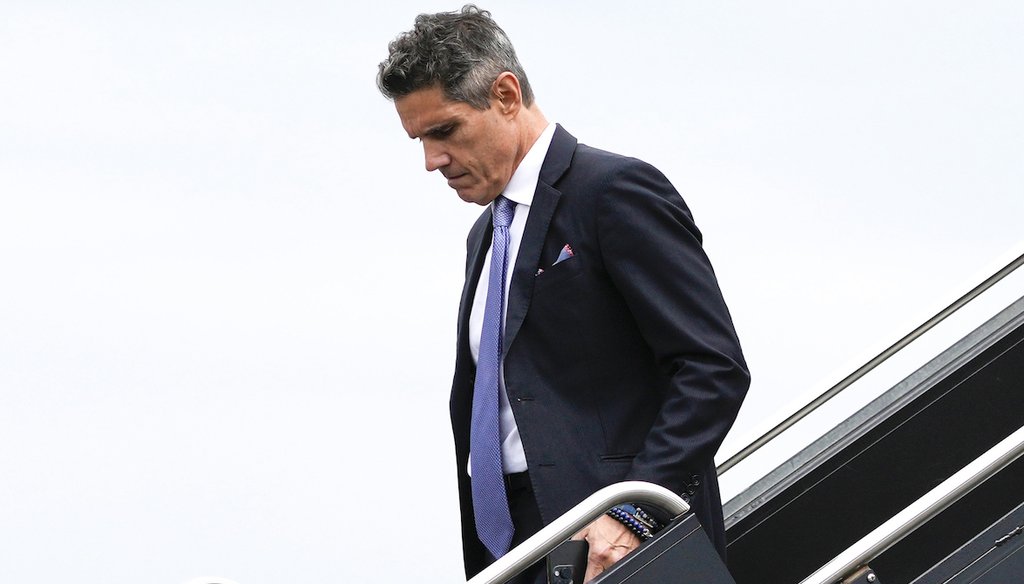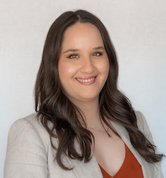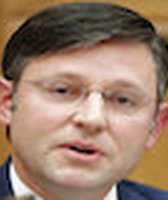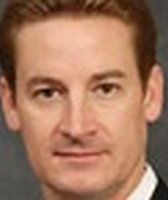Get PolitiFact in your inbox.

John Lauro, an attorney for former President Donald Trump, arrives with Trump for his arraignment in Washington on Aug. 3, 2023. (AP)
In a rarity for the Sunday morning shows, former President Donald Trump’s lawyer, John Lauro, appeared on each of the five weekly political talkfests.
Lauro’s Aug. 6 appearances on ABC, CBS, NBC, CNN and Fox News came just days after Trump was indicted for the third time in recent months, this one a federal indictment for charges that Trump sought to overturn the results of the 2020 election.
In the interviews, Lauro often returned to the argument that the indictment tramples on Trump’s First Amendment rights, and that the former president was merely asking other officials questions rather than pressuring them. But the talk shows’ hosts pushed back, and legal experts said they saw Lauro’s statements as political positioning rather than a true legal defense.
"Conflating protected political advocacy with conspiring to commit federal crimes might work to some extent in the court of public opinion, but won’t be much of a defense in an actual court," said Timothy Zick, a College of William & Mary law professor.
We examined a few of Lauro’s statements with insights from legal experts.
("Fox News Sunday")
Both Trump and his lawyers have repeatedly argued that the most recent indictment infringes on his First Amendment rights. The indictment sought by Justice Department Special Counsel Jack Smith anticipated this, saying, "The Defendant had a right, like every American, to speak publicly about the election and even to claim, falsely, that there had been outcome-determinative fraud during the election and that he had won."
Trump wasn’t charged for speaking his mind. The charges relate to his actions.
"Trump has First Amendment rights, but that does not mean that what he says and does to further a scheme to defraud is legal," said Joan Meyer, a partner at the law firm Thompson Hine LLP and a former federal prosecutor. "If your statements are part of an agreement to commit an unlawful act with your co-conspirators, the admission of these statements is fair game in a prosecution and can be used as evidence against you."
Legal experts offered several classic law school examples of speech that does not merit First Amendment protection because it is criminal in nature. A mafia boss, for instance, might say to a henchman how nice it would be if his enemy suffers, and the henchman understands that to mean he should injure his boss’s enemy.
"Conspiracies and fraud are usually engaged in through speech, yet no court has ever suggested that these types of criminal charges violate the First Amendment," said Thomas Healy, a Seton Hall University law professor.
For instance, in the 1949 case Giboney v. Empire Storage & Ice Co., Justice Hugo Black wrote that "it has never been deemed an abridgment of freedom of speech" to criminalize behavior because it was carried out by speech.
In the 2008 case United States v. Williams, Justice Antonin Scalia wrote that offers to engage in illegal transactions are excluded from First Amendment protection.
And in the 2012 case Alvarez v. United States, Justice Anthony Kennedy wrote that when false claims are made to secure "valuable considerations," which Kennedy defined to include a "fraud," it is "well established that the government may restrict speech without affronting the First Amendment."
Healy said this principle "is upheld in federal courts every day, as defendants are prosecuted for fraudulent statements for material gain in a variety of contexts, such as insurance fraud, bank fraud, credit card fraud, securities fraud, and mail and wire fraud."
Healy added that the First Amendment could have come into play had the indictment included an additional charge — one related to inciting the crowd to storm the U.S. Capitol on Jan. 6, 2021. If that charge had been brought, then the 1969 case Brandenburg v. Ohio "would require the government to prove that Trump’s speech was intended to, and likely to, produce imminent unlawful conduct," Healy said.
Nor is Trump charged with lying on the campaign trail, which would "raise First Amendment concerns because it might chill legitimate political debate," Healy said. Rather, he is charged with "trying to overturn the results of the election by running a conspiracy to pressure state legislatures and his vice president to replace the legitimate slates of electors with fake slates of electors."
(CNN’s "State of the Union")
Legal experts say "aspirational" is meaningless in this context.
"‘Aspirational’ is not a defense to criminal conduct," said Neama Rahmani, a former federal prosecutor who is now president of West Coast Trial Lawyers. "Attempting to commit a crime is a crime."
Asking a question "is a form of speech covered by the First Amendment," said Gregory P. Magarian, a law professor at Washington University in St. Louis. He added that Trump could have asked Pence or others for their professional opinion without asking them to break the law.
"Requesting that someone violate the law is not protected by the First Amendment," he said. "If I ask you to perjure yourself in a trial, or if I ask if you would accept a payment to commit a murder for me, the First Amendment does not shield me from criminal liability for those ‘aspirational’ questions."
(NBC’s "Meet the Press")
The word choice of "technical violation" flummoxed the experts.
The indictment charges Trump with conspiring to defraud the United States, conspiring to suppress voting rights, conspiring to obstruct an official proceeding, and attempting to obstruct an official proceeding. These are all based on U.S. laws.
"Trump wasn’t charged with a ‘technical violation of the Constitution,’" Meyer said. "He was charged under specific criminal statutes. These broad and vague statements from Trump lawyers about violations of the Constitution may further the political narrative but don’t have much to do with his criminal defense."
(CNN’s "State of the Union")
Lauro said after Pence rejected a "number of scenarios" that would have paused or halted the certification of votes in the 2020 election, "there was a peaceful transition of power," which is "how the Constitution works."
CNN anchor Dana Bash scoffed at that, saying, "What happened on January 6 was not peaceful." In their back and forth, Lauro referred to Biden’s inauguration, clarifying that he was not saying the Capitol riot "was in any way appropriate," but "the ultimate power of the presidency was transferred to Mr. Biden."
Lauro’s comment downplays the significance of the Capitol attack.
As lawmakers began to count and certify the Electoral College votes of the 2020 election, Trump supporters forced their way into the Capitol, stripping police of their weapons, dragging officers to the ground, spraying them with chemical irritants and assaulting them. The rioters broke down barricades, scaled the walls and shattered windows, forcing the Electoral College vote count to stop for hours as lawmakers sought cover.
The certification was delayed for several hours, but Pence and lawmakers were able to certify the results at 3:44 a.m. Jan. 7, 2021, when the scene was secure.
Biden was inaugurated Jan. 20, 2021, in a peaceful ceremony that drew heavy security; Trump did not attend.
RELATED: Read indictment of Donald Trump in the special counsel’s 2020 election, Jan. 6 investigation
RELATED: Fact-check: Donald Trump’s false and misleading responses after charges over role in Jan. 6 riot
Our Sources
CNN, 'You can't break the law': Dana Bash spars with Trump lawyer, Aug. 6, 2023
ABC News, 'This Week' Transcript 8-6-23: John Lauro, Rep. Pete Aguilar and Gov. Doug Burgum, Aug. 6, 2023
CBS News, Full transcript of "Face the Nation," Aug. 6, 2023, Aug. 6, 2023
NBC News, Meet the Press - August 6, 2023, Aug. 6, 2023
Fox News, Trump is ‘entitled’ to respond to DOJ’s third indictment: John Lauro, Aug. 6, 2023
Indictment of Donald Trump for efforts to overturn the 2020 election
Giboney v. Empire Storage & Ice Co.
PolitiFact, "How solid is Donald Trump’s First Amendment impeachment defense?" Feb. 12, 2021
Email interview with Bradley Moss, partner with the law firm Mark S. Zaid, P.C., Aug. 7, 2023
Email interview with Seth Kreimer, University of Pennsylvania law professor, Aug. 7, 2023
Email interview with Timothy Zick, law professor at the College of William & Mary, Aug. 7, 2023
Email interview with Gregory P. Magarian, law professor at Washington University in St. Louis, Aug. 7, 2023
Email interview with Neama Rahmani, former federal prosecutor who is now president of West Coast Trial Lawyers, Aug. 7, 2023
Email interview with Thomas Healy, Seton Hall University law professor, Aug. 7, 2023
Email interview with Joan Meyer, partner at the law firm Thompson Hine LLP and a former federal prosecutor, Aug. 7, 2023









































